TLAW 402 Company Law Assignment: Directors' Duties and Insolvency
VerifiedAdded on 2023/03/17
|11
|2463
|62
Homework Assignment
AI Summary
This assignment analyzes a case study involving Shilpa and Sonal, directors of Sonu Pty Ltd, who are facing potential liabilities under the Corporations Act 2001 (Cth) due to the company's insolvency. The assignment addresses the issue of whether the directors can be sued to recover debts, examining the rules regarding directors' duties, insolvent trading (specifically Section 588G), and the potential civil and criminal penalties they may face. The solution applies these rules to the case, considering the directors' actions and the company's financial situation. Furthermore, the assignment explores the consequences of the directors' actions, including the legal remedies ASIC can pursue, such as monetary penalties, compensation orders, and director disqualification. The analysis highlights the doctrine of lifting the corporate veil and its relevance to the case, referencing relevant legal precedents to support the arguments and conclusions regarding the directors' potential liabilities under Australian company law.
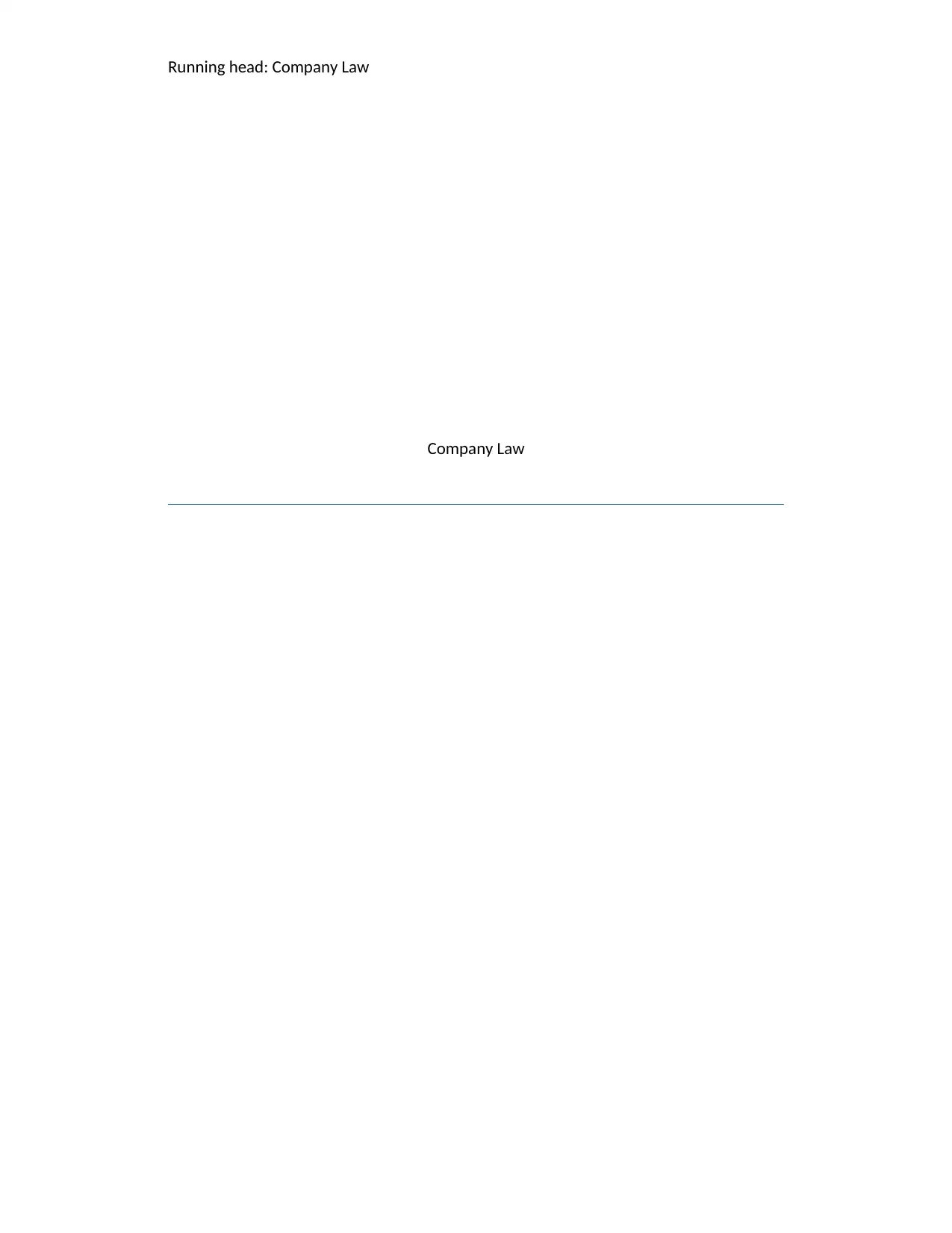
Running head: Company Law
Company Law
Company Law
Paraphrase This Document
Need a fresh take? Get an instant paraphrase of this document with our AI Paraphraser
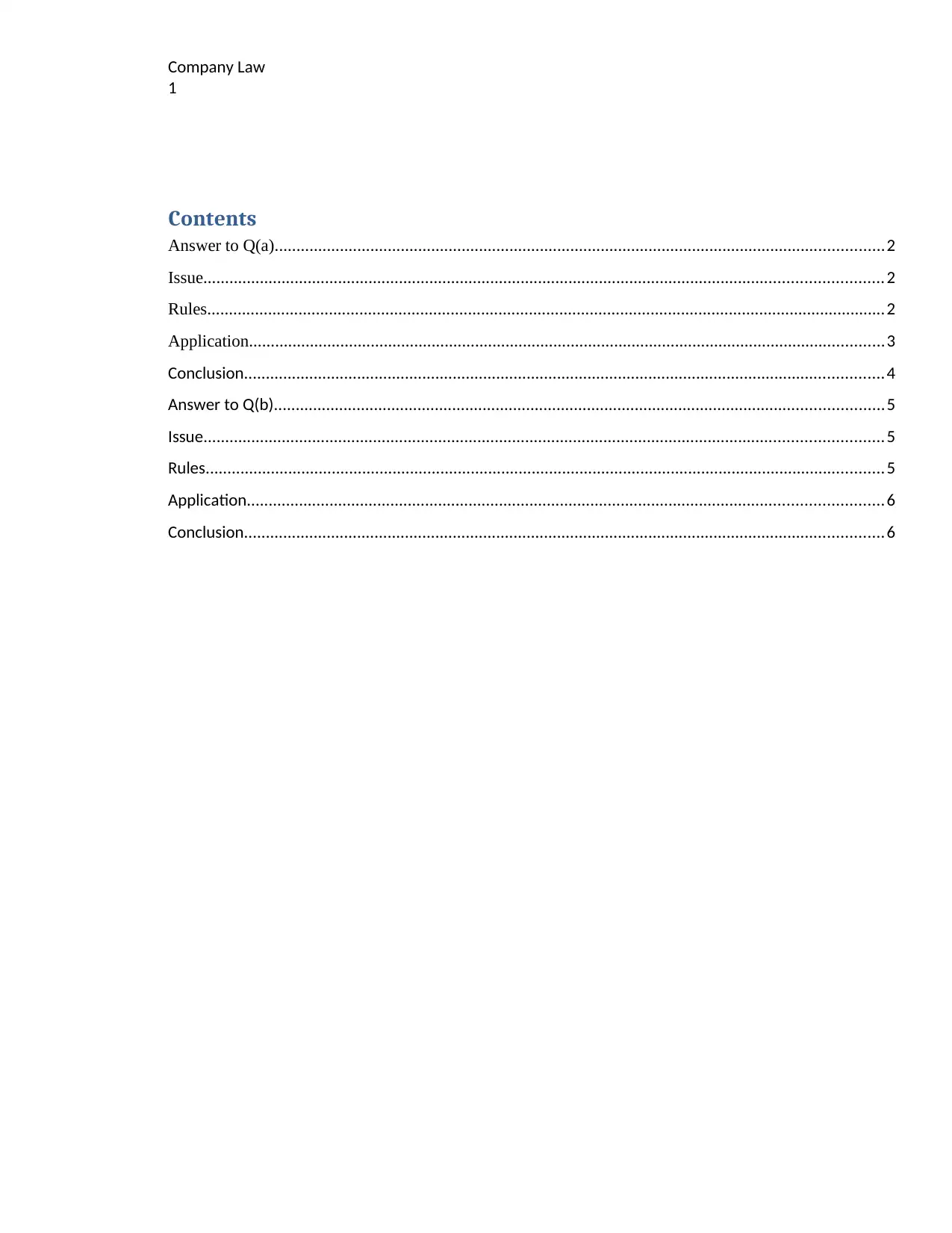
Company Law
1
Contents
Answer to Q(a)............................................................................................................................................2
Issue............................................................................................................................................................2
Rules............................................................................................................................................................2
Application..................................................................................................................................................3
Conclusion...................................................................................................................................................4
Answer to Q(b)............................................................................................................................................5
Issue............................................................................................................................................................5
Rules............................................................................................................................................................5
Application..................................................................................................................................................6
Conclusion...................................................................................................................................................6
1
Contents
Answer to Q(a)............................................................................................................................................2
Issue............................................................................................................................................................2
Rules............................................................................................................................................................2
Application..................................................................................................................................................3
Conclusion...................................................................................................................................................4
Answer to Q(b)............................................................................................................................................5
Issue............................................................................................................................................................5
Rules............................................................................................................................................................5
Application..................................................................................................................................................6
Conclusion...................................................................................................................................................6
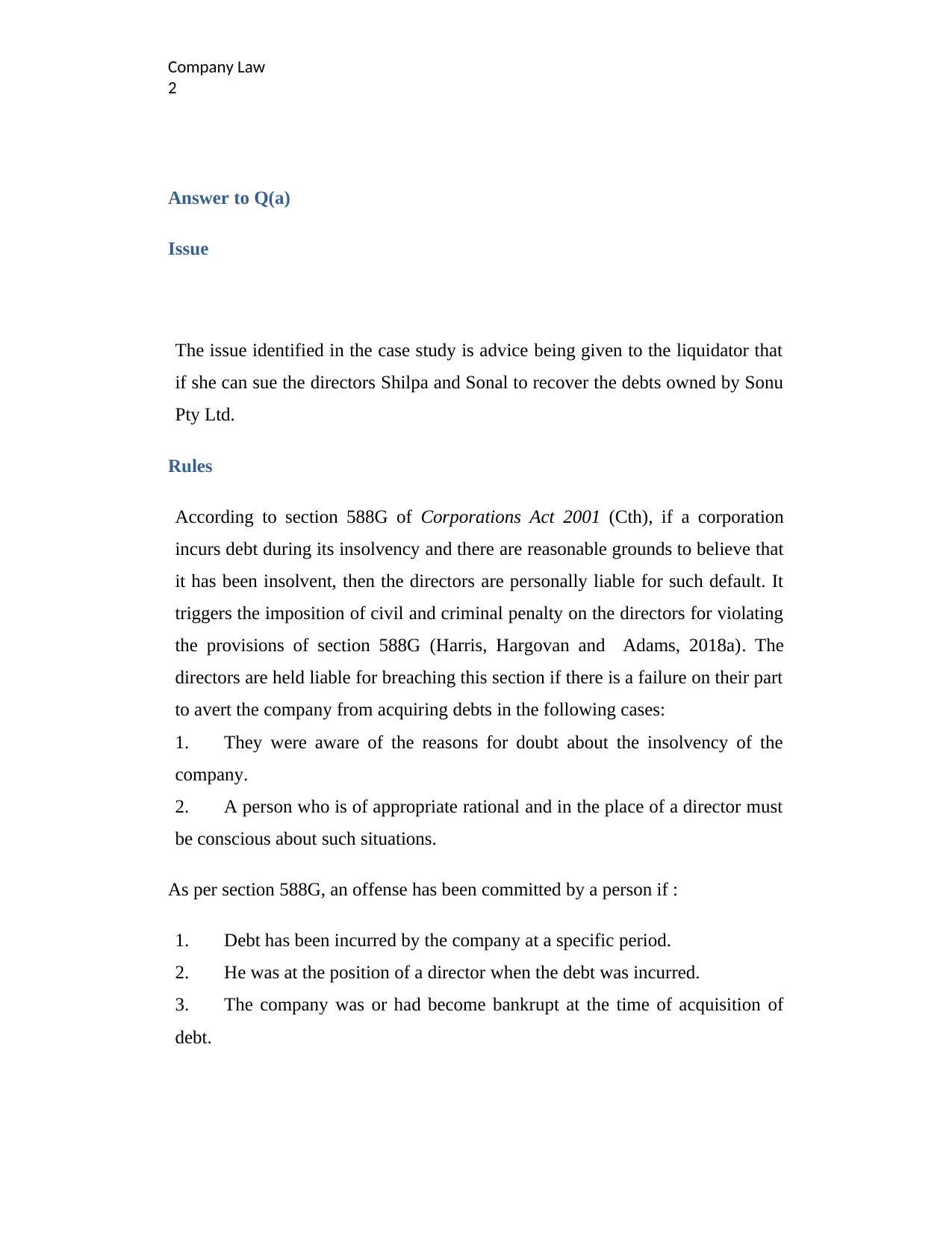
Company Law
2
Answer to Q(a)
Issue
The issue identified in the case study is advice being given to the liquidator that
if she can sue the directors Shilpa and Sonal to recover the debts owned by Sonu
Pty Ltd.
Rules
According to section 588G of Corporations Act 2001 (Cth), if a corporation
incurs debt during its insolvency and there are reasonable grounds to believe that
it has been insolvent, then the directors are personally liable for such default. It
triggers the imposition of civil and criminal penalty on the directors for violating
the provisions of section 588G (Harris, Hargovan and Adams, 2018a). The
directors are held liable for breaching this section if there is a failure on their part
to avert the company from acquiring debts in the following cases:
1. They were aware of the reasons for doubt about the insolvency of the
company.
2. A person who is of appropriate rational and in the place of a director must
be conscious about such situations.
As per section 588G, an offense has been committed by a person if :
1. Debt has been incurred by the company at a specific period.
2. He was at the position of a director when the debt was incurred.
3. The company was or had become bankrupt at the time of acquisition of
debt.
2
Answer to Q(a)
Issue
The issue identified in the case study is advice being given to the liquidator that
if she can sue the directors Shilpa and Sonal to recover the debts owned by Sonu
Pty Ltd.
Rules
According to section 588G of Corporations Act 2001 (Cth), if a corporation
incurs debt during its insolvency and there are reasonable grounds to believe that
it has been insolvent, then the directors are personally liable for such default. It
triggers the imposition of civil and criminal penalty on the directors for violating
the provisions of section 588G (Harris, Hargovan and Adams, 2018a). The
directors are held liable for breaching this section if there is a failure on their part
to avert the company from acquiring debts in the following cases:
1. They were aware of the reasons for doubt about the insolvency of the
company.
2. A person who is of appropriate rational and in the place of a director must
be conscious about such situations.
As per section 588G, an offense has been committed by a person if :
1. Debt has been incurred by the company at a specific period.
2. He was at the position of a director when the debt was incurred.
3. The company was or had become bankrupt at the time of acquisition of
debt.
⊘ This is a preview!⊘
Do you want full access?
Subscribe today to unlock all pages.

Trusted by 1+ million students worldwide
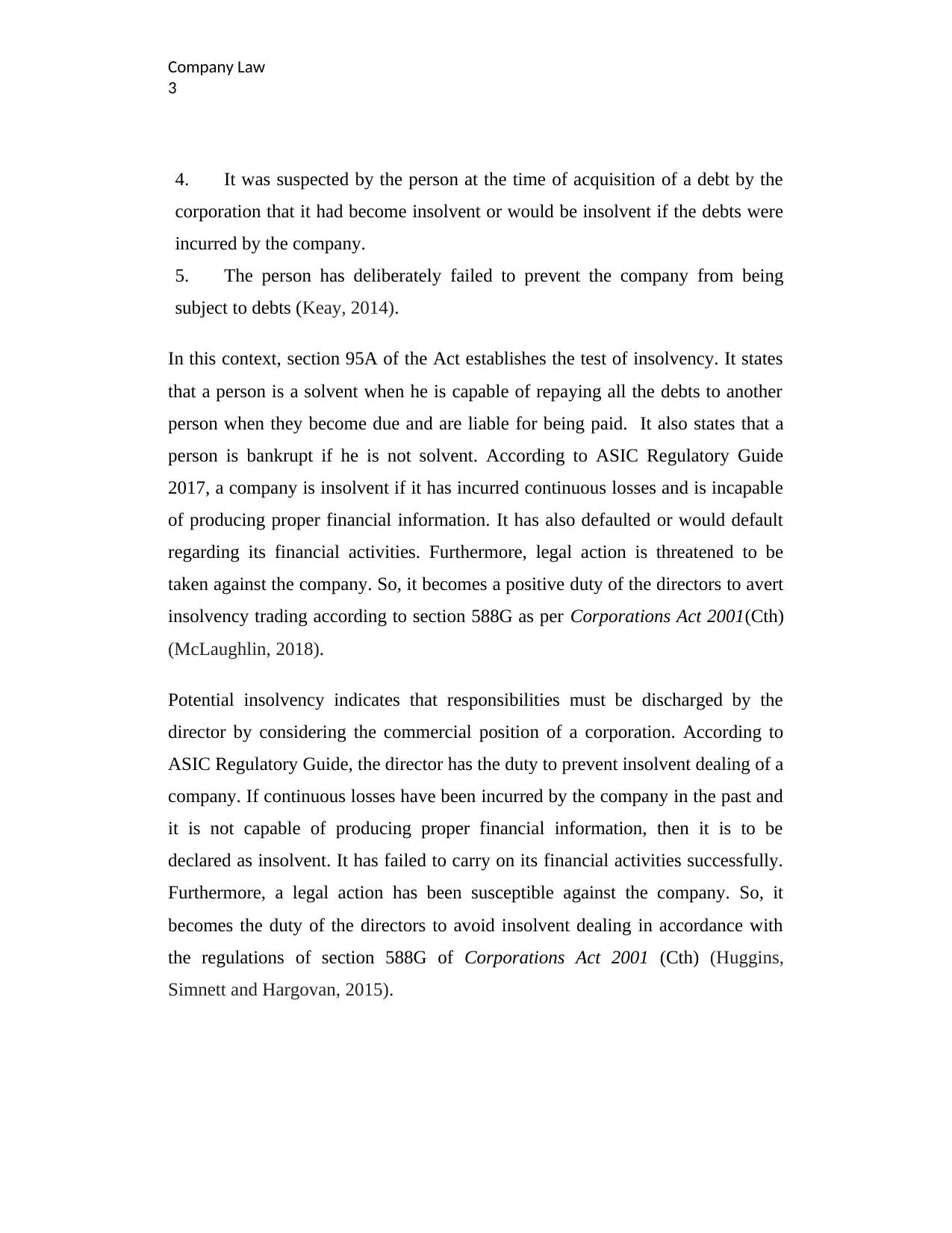
Company Law
3
4. It was suspected by the person at the time of acquisition of a debt by the
corporation that it had become insolvent or would be insolvent if the debts were
incurred by the company.
5. The person has deliberately failed to prevent the company from being
subject to debts (Keay, 2014).
In this context, section 95A of the Act establishes the test of insolvency. It states
that a person is a solvent when he is capable of repaying all the debts to another
person when they become due and are liable for being paid. It also states that a
person is bankrupt if he is not solvent. According to ASIC Regulatory Guide
2017, a company is insolvent if it has incurred continuous losses and is incapable
of producing proper financial information. It has also defaulted or would default
regarding its financial activities. Furthermore, legal action is threatened to be
taken against the company. So, it becomes a positive duty of the directors to avert
insolvency trading according to section 588G as per Corporations Act 2001(Cth)
(McLaughlin, 2018).
Potential insolvency indicates that responsibilities must be discharged by the
director by considering the commercial position of a corporation. According to
ASIC Regulatory Guide, the director has the duty to prevent insolvent dealing of a
company. If continuous losses have been incurred by the company in the past and
it is not capable of producing proper financial information, then it is to be
declared as insolvent. It has failed to carry on its financial activities successfully.
Furthermore, a legal action has been susceptible against the company. So, it
becomes the duty of the directors to avoid insolvent dealing in accordance with
the regulations of section 588G of Corporations Act 2001 (Cth) (Huggins,
Simnett and Hargovan, 2015).
3
4. It was suspected by the person at the time of acquisition of a debt by the
corporation that it had become insolvent or would be insolvent if the debts were
incurred by the company.
5. The person has deliberately failed to prevent the company from being
subject to debts (Keay, 2014).
In this context, section 95A of the Act establishes the test of insolvency. It states
that a person is a solvent when he is capable of repaying all the debts to another
person when they become due and are liable for being paid. It also states that a
person is bankrupt if he is not solvent. According to ASIC Regulatory Guide
2017, a company is insolvent if it has incurred continuous losses and is incapable
of producing proper financial information. It has also defaulted or would default
regarding its financial activities. Furthermore, legal action is threatened to be
taken against the company. So, it becomes a positive duty of the directors to avert
insolvency trading according to section 588G as per Corporations Act 2001(Cth)
(McLaughlin, 2018).
Potential insolvency indicates that responsibilities must be discharged by the
director by considering the commercial position of a corporation. According to
ASIC Regulatory Guide, the director has the duty to prevent insolvent dealing of a
company. If continuous losses have been incurred by the company in the past and
it is not capable of producing proper financial information, then it is to be
declared as insolvent. It has failed to carry on its financial activities successfully.
Furthermore, a legal action has been susceptible against the company. So, it
becomes the duty of the directors to avoid insolvent dealing in accordance with
the regulations of section 588G of Corporations Act 2001 (Cth) (Huggins,
Simnett and Hargovan, 2015).
Paraphrase This Document
Need a fresh take? Get an instant paraphrase of this document with our AI Paraphraser
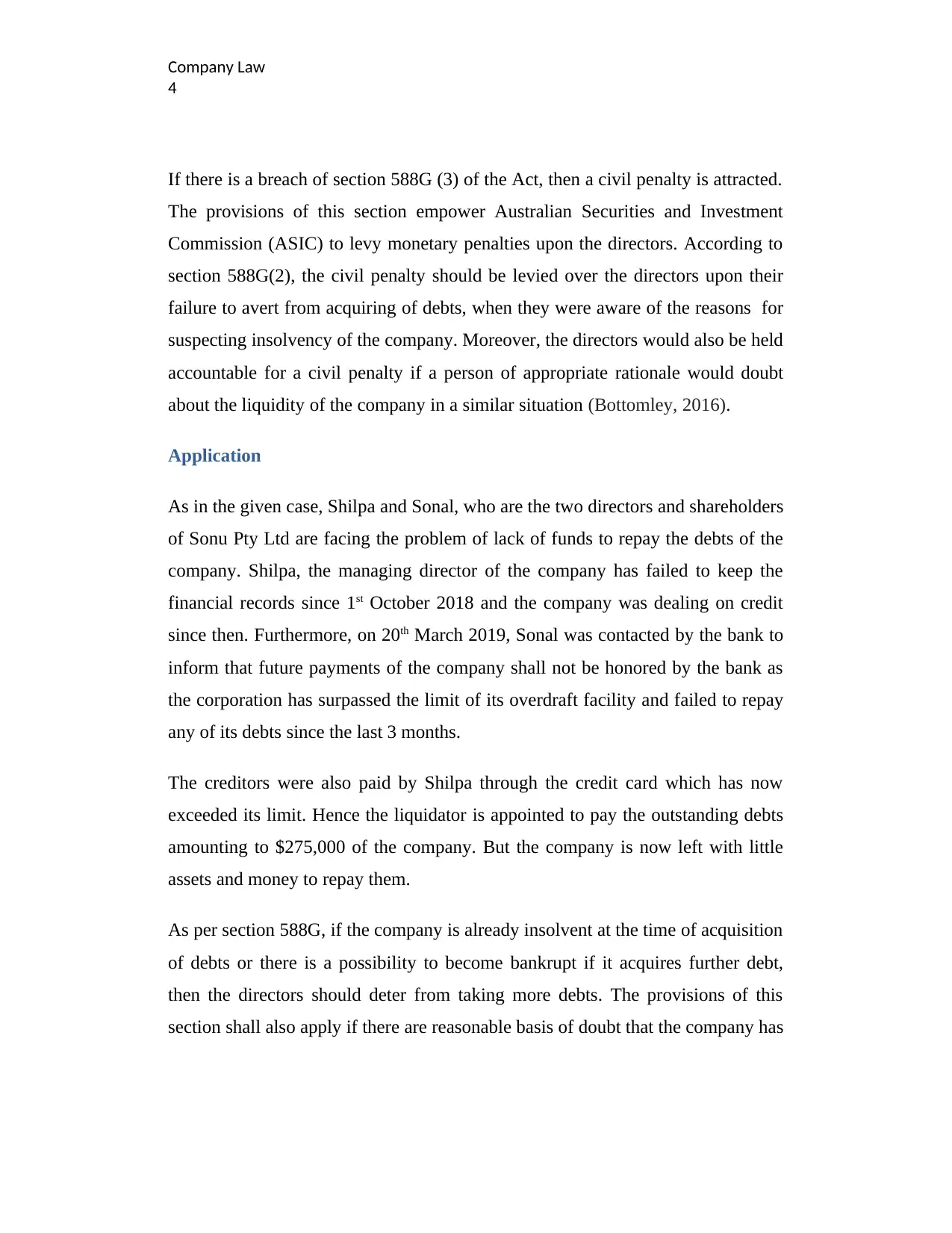
Company Law
4
If there is a breach of section 588G (3) of the Act, then a civil penalty is attracted.
The provisions of this section empower Australian Securities and Investment
Commission (ASIC) to levy monetary penalties upon the directors. According to
section 588G(2), the civil penalty should be levied over the directors upon their
failure to avert from acquiring of debts, when they were aware of the reasons for
suspecting insolvency of the company. Moreover, the directors would also be held
accountable for a civil penalty if a person of appropriate rationale would doubt
about the liquidity of the company in a similar situation (Bottomley, 2016).
Application
As in the given case, Shilpa and Sonal, who are the two directors and shareholders
of Sonu Pty Ltd are facing the problem of lack of funds to repay the debts of the
company. Shilpa, the managing director of the company has failed to keep the
financial records since 1st October 2018 and the company was dealing on credit
since then. Furthermore, on 20th March 2019, Sonal was contacted by the bank to
inform that future payments of the company shall not be honored by the bank as
the corporation has surpassed the limit of its overdraft facility and failed to repay
any of its debts since the last 3 months.
The creditors were also paid by Shilpa through the credit card which has now
exceeded its limit. Hence the liquidator is appointed to pay the outstanding debts
amounting to $275,000 of the company. But the company is now left with little
assets and money to repay them.
As per section 588G, if the company is already insolvent at the time of acquisition
of debts or there is a possibility to become bankrupt if it acquires further debt,
then the directors should deter from taking more debts. The provisions of this
section shall also apply if there are reasonable basis of doubt that the company has
4
If there is a breach of section 588G (3) of the Act, then a civil penalty is attracted.
The provisions of this section empower Australian Securities and Investment
Commission (ASIC) to levy monetary penalties upon the directors. According to
section 588G(2), the civil penalty should be levied over the directors upon their
failure to avert from acquiring of debts, when they were aware of the reasons for
suspecting insolvency of the company. Moreover, the directors would also be held
accountable for a civil penalty if a person of appropriate rationale would doubt
about the liquidity of the company in a similar situation (Bottomley, 2016).
Application
As in the given case, Shilpa and Sonal, who are the two directors and shareholders
of Sonu Pty Ltd are facing the problem of lack of funds to repay the debts of the
company. Shilpa, the managing director of the company has failed to keep the
financial records since 1st October 2018 and the company was dealing on credit
since then. Furthermore, on 20th March 2019, Sonal was contacted by the bank to
inform that future payments of the company shall not be honored by the bank as
the corporation has surpassed the limit of its overdraft facility and failed to repay
any of its debts since the last 3 months.
The creditors were also paid by Shilpa through the credit card which has now
exceeded its limit. Hence the liquidator is appointed to pay the outstanding debts
amounting to $275,000 of the company. But the company is now left with little
assets and money to repay them.
As per section 588G, if the company is already insolvent at the time of acquisition
of debts or there is a possibility to become bankrupt if it acquires further debt,
then the directors should deter from taking more debts. The provisions of this
section shall also apply if there are reasonable basis of doubt that the company has
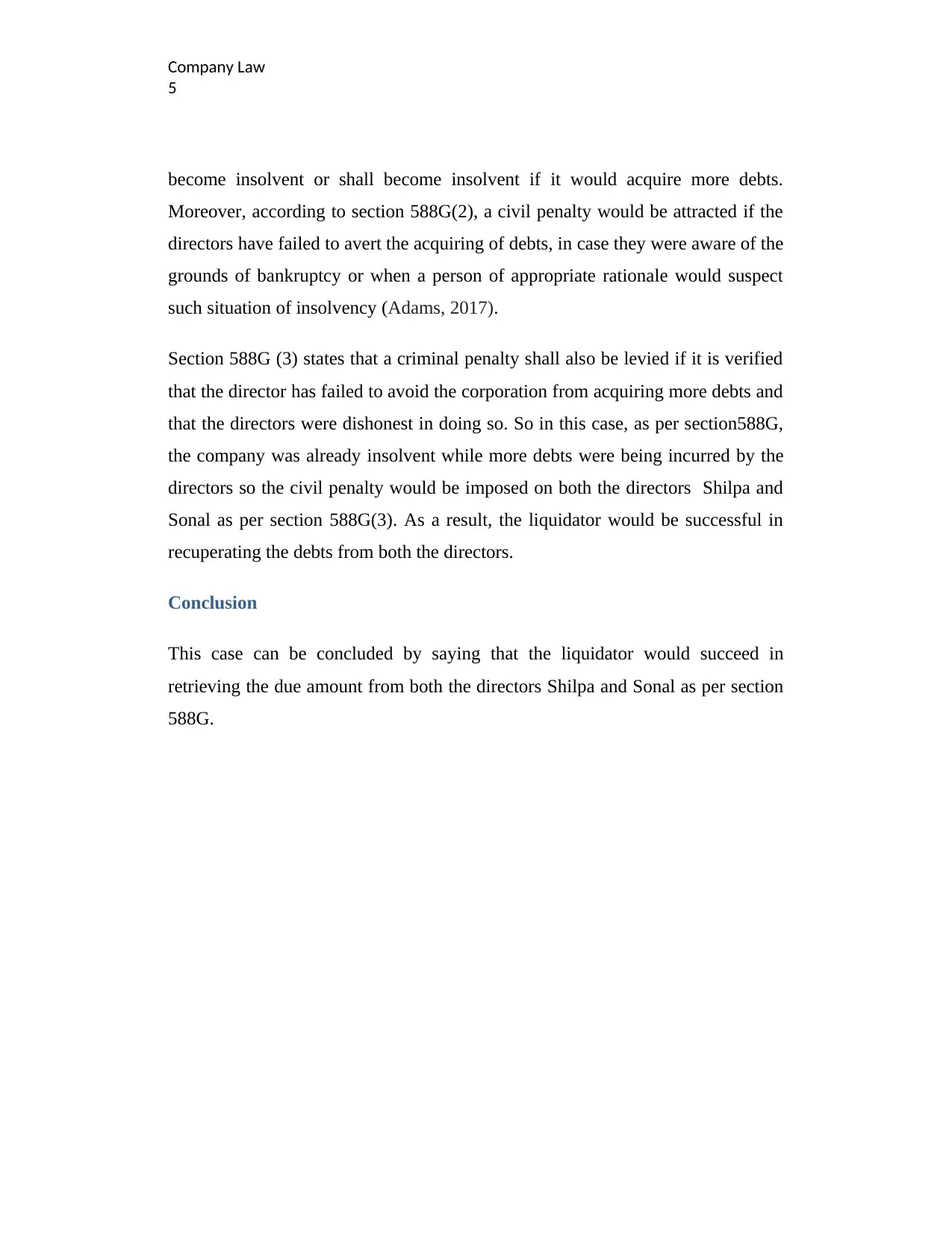
Company Law
5
become insolvent or shall become insolvent if it would acquire more debts.
Moreover, according to section 588G(2), a civil penalty would be attracted if the
directors have failed to avert the acquiring of debts, in case they were aware of the
grounds of bankruptcy or when a person of appropriate rationale would suspect
such situation of insolvency (Adams, 2017).
Section 588G (3) states that a criminal penalty shall also be levied if it is verified
that the director has failed to avoid the corporation from acquiring more debts and
that the directors were dishonest in doing so. So in this case, as per section588G,
the company was already insolvent while more debts were being incurred by the
directors so the civil penalty would be imposed on both the directors Shilpa and
Sonal as per section 588G(3). As a result, the liquidator would be successful in
recuperating the debts from both the directors.
Conclusion
This case can be concluded by saying that the liquidator would succeed in
retrieving the due amount from both the directors Shilpa and Sonal as per section
588G.
5
become insolvent or shall become insolvent if it would acquire more debts.
Moreover, according to section 588G(2), a civil penalty would be attracted if the
directors have failed to avert the acquiring of debts, in case they were aware of the
grounds of bankruptcy or when a person of appropriate rationale would suspect
such situation of insolvency (Adams, 2017).
Section 588G (3) states that a criminal penalty shall also be levied if it is verified
that the director has failed to avoid the corporation from acquiring more debts and
that the directors were dishonest in doing so. So in this case, as per section588G,
the company was already insolvent while more debts were being incurred by the
directors so the civil penalty would be imposed on both the directors Shilpa and
Sonal as per section 588G(3). As a result, the liquidator would be successful in
recuperating the debts from both the directors.
Conclusion
This case can be concluded by saying that the liquidator would succeed in
retrieving the due amount from both the directors Shilpa and Sonal as per section
588G.
⊘ This is a preview!⊘
Do you want full access?
Subscribe today to unlock all pages.

Trusted by 1+ million students worldwide
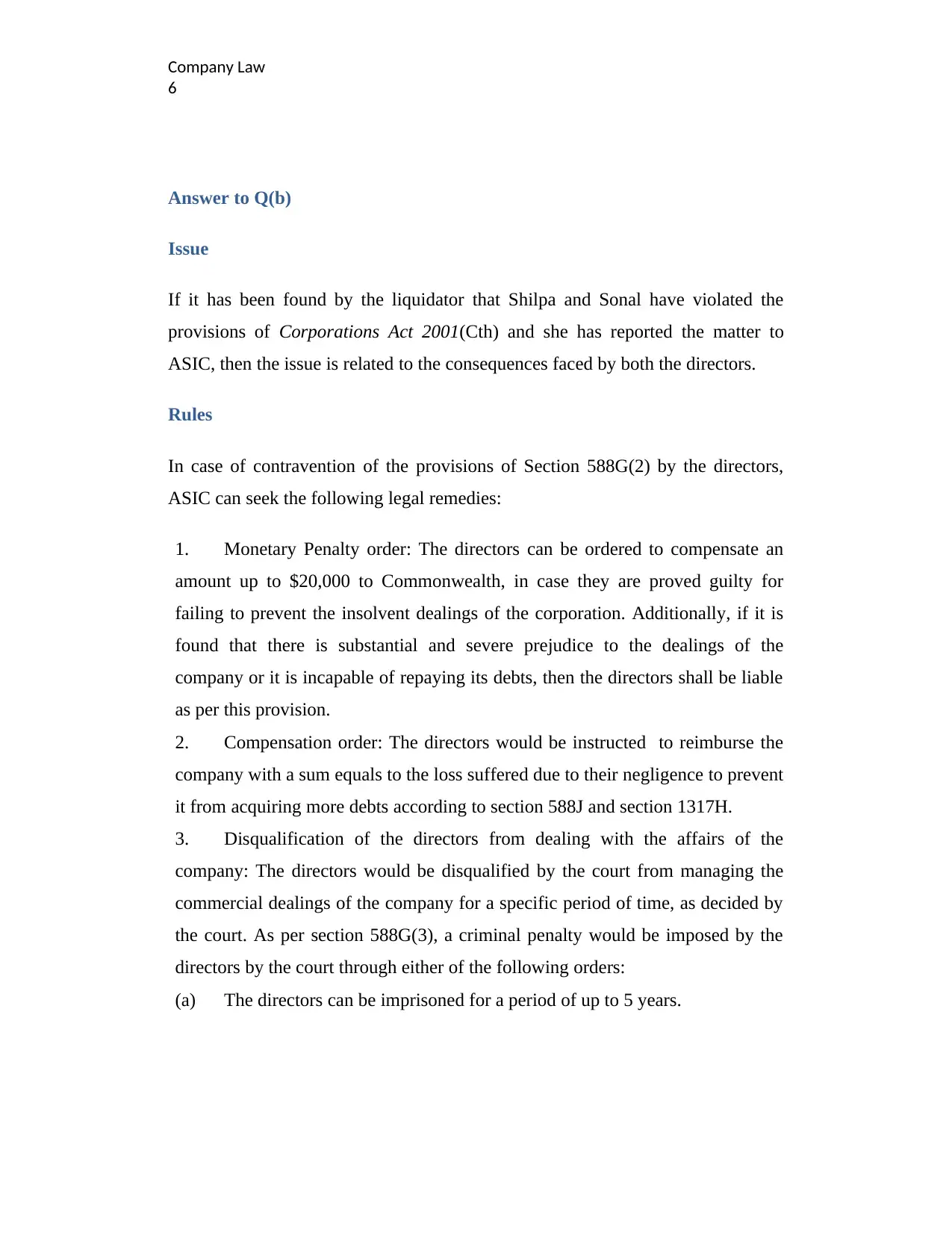
Company Law
6
Answer to Q(b)
Issue
If it has been found by the liquidator that Shilpa and Sonal have violated the
provisions of Corporations Act 2001(Cth) and she has reported the matter to
ASIC, then the issue is related to the consequences faced by both the directors.
Rules
In case of contravention of the provisions of Section 588G(2) by the directors,
ASIC can seek the following legal remedies:
1. Monetary Penalty order: The directors can be ordered to compensate an
amount up to $20,000 to Commonwealth, in case they are proved guilty for
failing to prevent the insolvent dealings of the corporation. Additionally, if it is
found that there is substantial and severe prejudice to the dealings of the
company or it is incapable of repaying its debts, then the directors shall be liable
as per this provision.
2. Compensation order: The directors would be instructed to reimburse the
company with a sum equals to the loss suffered due to their negligence to prevent
it from acquiring more debts according to section 588J and section 1317H.
3. Disqualification of the directors from dealing with the affairs of the
company: The directors would be disqualified by the court from managing the
commercial dealings of the company for a specific period of time, as decided by
the court. As per section 588G(3), a criminal penalty would be imposed by the
directors by the court through either of the following orders:
(a) The directors can be imprisoned for a period of up to 5 years.
6
Answer to Q(b)
Issue
If it has been found by the liquidator that Shilpa and Sonal have violated the
provisions of Corporations Act 2001(Cth) and she has reported the matter to
ASIC, then the issue is related to the consequences faced by both the directors.
Rules
In case of contravention of the provisions of Section 588G(2) by the directors,
ASIC can seek the following legal remedies:
1. Monetary Penalty order: The directors can be ordered to compensate an
amount up to $20,000 to Commonwealth, in case they are proved guilty for
failing to prevent the insolvent dealings of the corporation. Additionally, if it is
found that there is substantial and severe prejudice to the dealings of the
company or it is incapable of repaying its debts, then the directors shall be liable
as per this provision.
2. Compensation order: The directors would be instructed to reimburse the
company with a sum equals to the loss suffered due to their negligence to prevent
it from acquiring more debts according to section 588J and section 1317H.
3. Disqualification of the directors from dealing with the affairs of the
company: The directors would be disqualified by the court from managing the
commercial dealings of the company for a specific period of time, as decided by
the court. As per section 588G(3), a criminal penalty would be imposed by the
directors by the court through either of the following orders:
(a) The directors can be imprisoned for a period of up to 5 years.
Paraphrase This Document
Need a fresh take? Get an instant paraphrase of this document with our AI Paraphraser
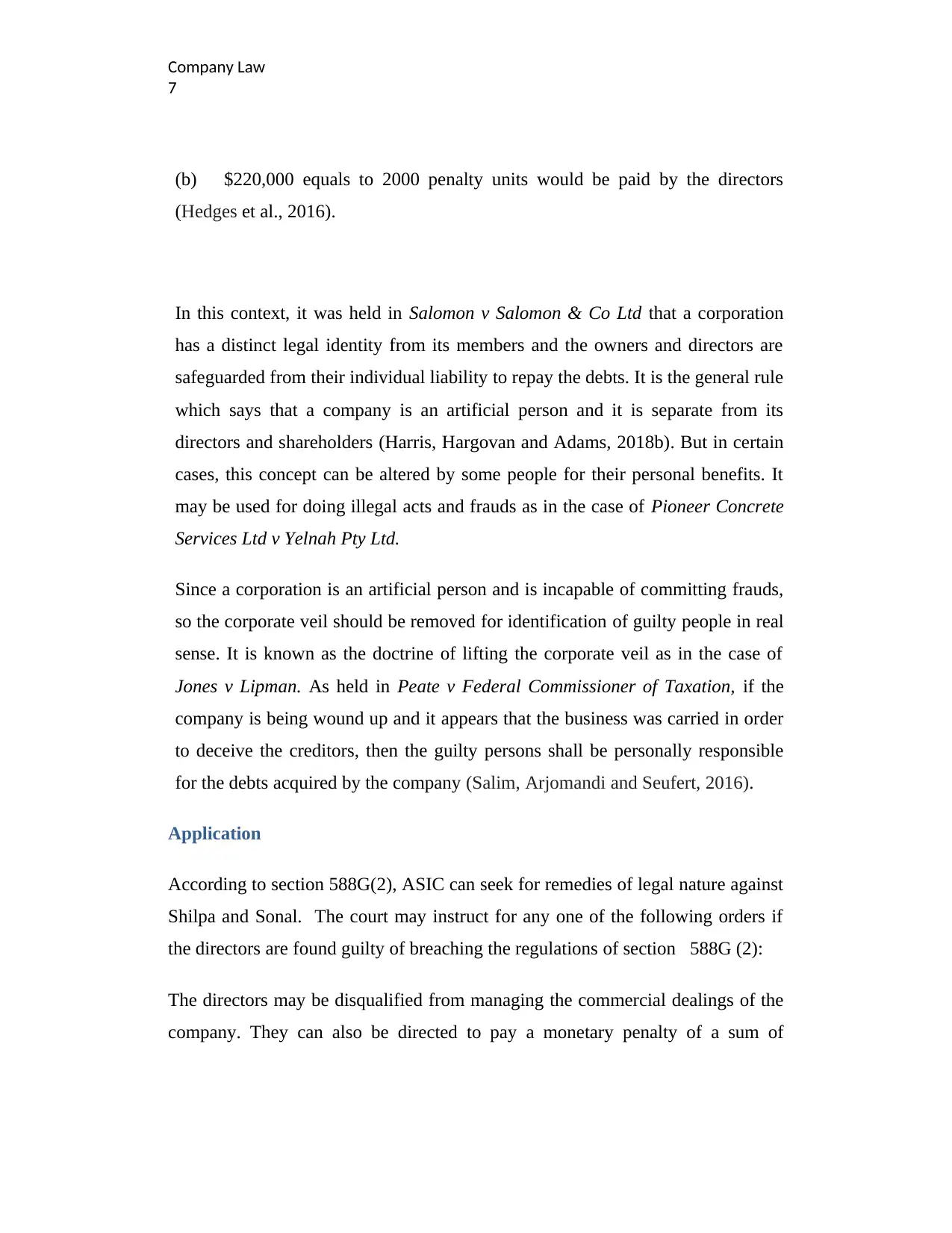
Company Law
7
(b) $220,000 equals to 2000 penalty units would be paid by the directors
(Hedges et al., 2016).
In this context, it was held in Salomon v Salomon & Co Ltd that a corporation
has a distinct legal identity from its members and the owners and directors are
safeguarded from their individual liability to repay the debts. It is the general rule
which says that a company is an artificial person and it is separate from its
directors and shareholders (Harris, Hargovan and Adams, 2018b). But in certain
cases, this concept can be altered by some people for their personal benefits. It
may be used for doing illegal acts and frauds as in the case of Pioneer Concrete
Services Ltd v Yelnah Pty Ltd.
Since a corporation is an artificial person and is incapable of committing frauds,
so the corporate veil should be removed for identification of guilty people in real
sense. It is known as the doctrine of lifting the corporate veil as in the case of
Jones v Lipman. As held in Peate v Federal Commissioner of Taxation, if the
company is being wound up and it appears that the business was carried in order
to deceive the creditors, then the guilty persons shall be personally responsible
for the debts acquired by the company (Salim, Arjomandi and Seufert, 2016).
Application
According to section 588G(2), ASIC can seek for remedies of legal nature against
Shilpa and Sonal. The court may instruct for any one of the following orders if
the directors are found guilty of breaching the regulations of section 588G (2):
The directors may be disqualified from managing the commercial dealings of the
company. They can also be directed to pay a monetary penalty of a sum of
7
(b) $220,000 equals to 2000 penalty units would be paid by the directors
(Hedges et al., 2016).
In this context, it was held in Salomon v Salomon & Co Ltd that a corporation
has a distinct legal identity from its members and the owners and directors are
safeguarded from their individual liability to repay the debts. It is the general rule
which says that a company is an artificial person and it is separate from its
directors and shareholders (Harris, Hargovan and Adams, 2018b). But in certain
cases, this concept can be altered by some people for their personal benefits. It
may be used for doing illegal acts and frauds as in the case of Pioneer Concrete
Services Ltd v Yelnah Pty Ltd.
Since a corporation is an artificial person and is incapable of committing frauds,
so the corporate veil should be removed for identification of guilty people in real
sense. It is known as the doctrine of lifting the corporate veil as in the case of
Jones v Lipman. As held in Peate v Federal Commissioner of Taxation, if the
company is being wound up and it appears that the business was carried in order
to deceive the creditors, then the guilty persons shall be personally responsible
for the debts acquired by the company (Salim, Arjomandi and Seufert, 2016).
Application
According to section 588G(2), ASIC can seek for remedies of legal nature against
Shilpa and Sonal. The court may instruct for any one of the following orders if
the directors are found guilty of breaching the regulations of section 588G (2):
The directors may be disqualified from managing the commercial dealings of the
company. They can also be directed to pay a monetary penalty of a sum of
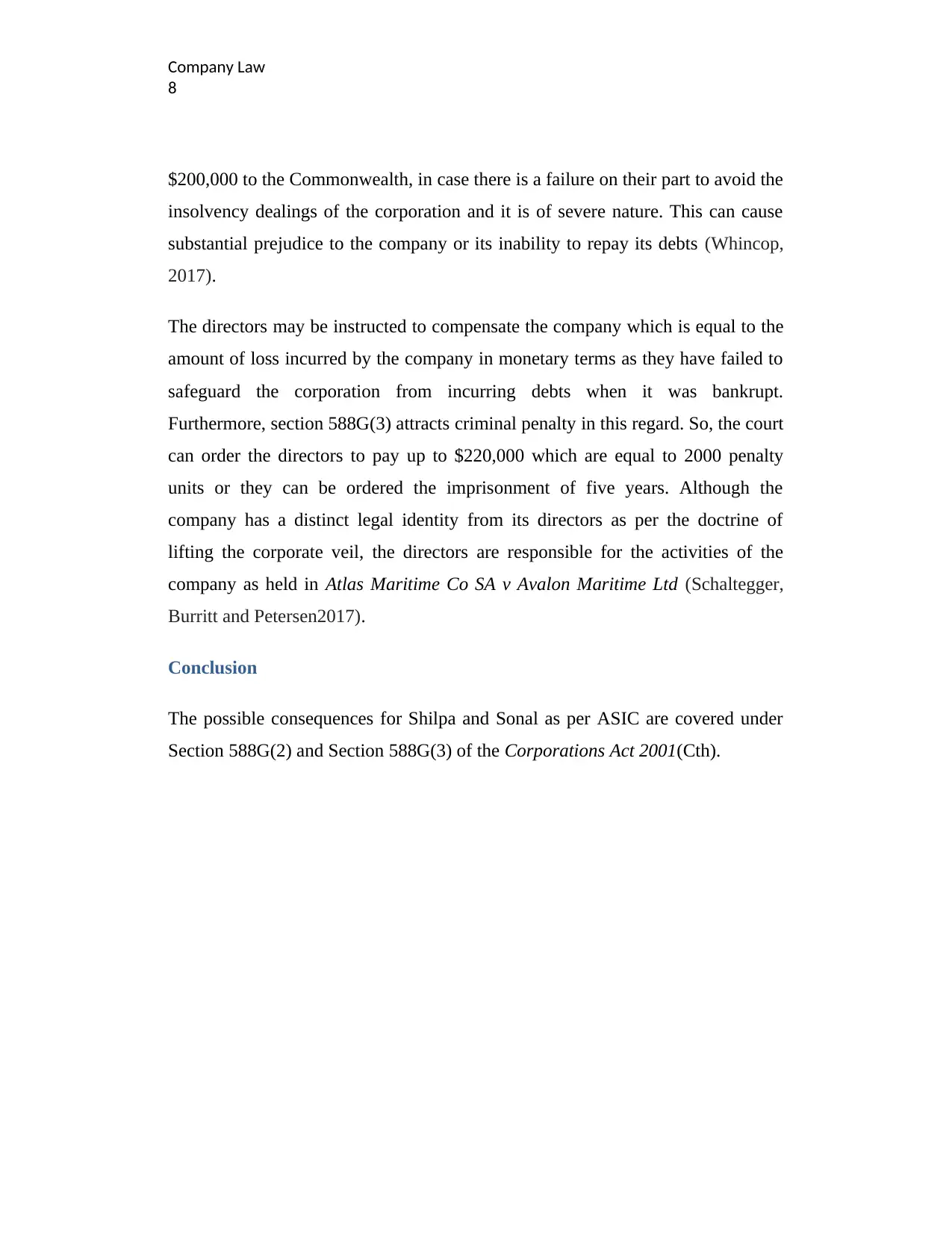
Company Law
8
$200,000 to the Commonwealth, in case there is a failure on their part to avoid the
insolvency dealings of the corporation and it is of severe nature. This can cause
substantial prejudice to the company or its inability to repay its debts (Whincop,
2017).
The directors may be instructed to compensate the company which is equal to the
amount of loss incurred by the company in monetary terms as they have failed to
safeguard the corporation from incurring debts when it was bankrupt.
Furthermore, section 588G(3) attracts criminal penalty in this regard. So, the court
can order the directors to pay up to $220,000 which are equal to 2000 penalty
units or they can be ordered the imprisonment of five years. Although the
company has a distinct legal identity from its directors as per the doctrine of
lifting the corporate veil, the directors are responsible for the activities of the
company as held in Atlas Maritime Co SA v Avalon Maritime Ltd (Schaltegger,
Burritt and Petersen2017).
Conclusion
The possible consequences for Shilpa and Sonal as per ASIC are covered under
Section 588G(2) and Section 588G(3) of the Corporations Act 2001(Cth).
8
$200,000 to the Commonwealth, in case there is a failure on their part to avoid the
insolvency dealings of the corporation and it is of severe nature. This can cause
substantial prejudice to the company or its inability to repay its debts (Whincop,
2017).
The directors may be instructed to compensate the company which is equal to the
amount of loss incurred by the company in monetary terms as they have failed to
safeguard the corporation from incurring debts when it was bankrupt.
Furthermore, section 588G(3) attracts criminal penalty in this regard. So, the court
can order the directors to pay up to $220,000 which are equal to 2000 penalty
units or they can be ordered the imprisonment of five years. Although the
company has a distinct legal identity from its directors as per the doctrine of
lifting the corporate veil, the directors are responsible for the activities of the
company as held in Atlas Maritime Co SA v Avalon Maritime Ltd (Schaltegger,
Burritt and Petersen2017).
Conclusion
The possible consequences for Shilpa and Sonal as per ASIC are covered under
Section 588G(2) and Section 588G(3) of the Corporations Act 2001(Cth).
⊘ This is a preview!⊘
Do you want full access?
Subscribe today to unlock all pages.

Trusted by 1+ million students worldwide
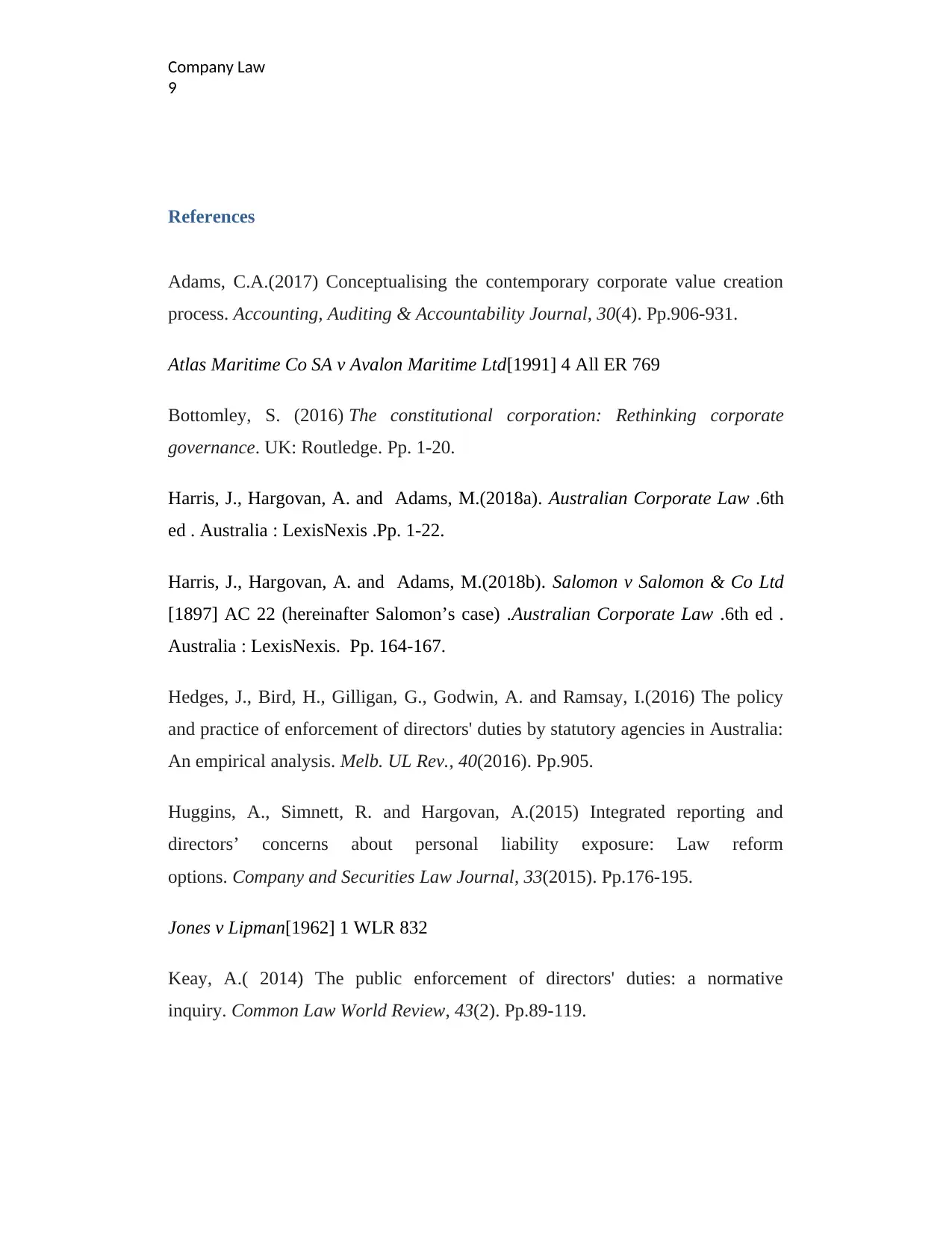
Company Law
9
References
Adams, C.A.(2017) Conceptualising the contemporary corporate value creation
process. Accounting, Auditing & Accountability Journal, 30(4). Pp.906-931.
Atlas Maritime Co SA v Avalon Maritime Ltd[1991] 4 All ER 769
Bottomley, S. (2016) The constitutional corporation: Rethinking corporate
governance. UK: Routledge. Pp. 1-20.
Harris, J., Hargovan, A. and Adams, M.(2018a). Australian Corporate Law .6th
ed . Australia : LexisNexis .Pp. 1-22.
Harris, J., Hargovan, A. and Adams, M.(2018b). Salomon v Salomon & Co Ltd
[1897] AC 22 (hereinafter Salomon’s case) .Australian Corporate Law .6th ed .
Australia : LexisNexis. Pp. 164-167.
Hedges, J., Bird, H., Gilligan, G., Godwin, A. and Ramsay, I.(2016) The policy
and practice of enforcement of directors' duties by statutory agencies in Australia:
An empirical analysis. Melb. UL Rev., 40(2016). Pp.905.
Huggins, A., Simnett, R. and Hargovan, A.(2015) Integrated reporting and
directors’ concerns about personal liability exposure: Law reform
options. Company and Securities Law Journal, 33(2015). Pp.176-195.
Jones v Lipman[1962] 1 WLR 832
Keay, A.( 2014) The public enforcement of directors' duties: a normative
inquiry. Common Law World Review, 43(2). Pp.89-119.
9
References
Adams, C.A.(2017) Conceptualising the contemporary corporate value creation
process. Accounting, Auditing & Accountability Journal, 30(4). Pp.906-931.
Atlas Maritime Co SA v Avalon Maritime Ltd[1991] 4 All ER 769
Bottomley, S. (2016) The constitutional corporation: Rethinking corporate
governance. UK: Routledge. Pp. 1-20.
Harris, J., Hargovan, A. and Adams, M.(2018a). Australian Corporate Law .6th
ed . Australia : LexisNexis .Pp. 1-22.
Harris, J., Hargovan, A. and Adams, M.(2018b). Salomon v Salomon & Co Ltd
[1897] AC 22 (hereinafter Salomon’s case) .Australian Corporate Law .6th ed .
Australia : LexisNexis. Pp. 164-167.
Hedges, J., Bird, H., Gilligan, G., Godwin, A. and Ramsay, I.(2016) The policy
and practice of enforcement of directors' duties by statutory agencies in Australia:
An empirical analysis. Melb. UL Rev., 40(2016). Pp.905.
Huggins, A., Simnett, R. and Hargovan, A.(2015) Integrated reporting and
directors’ concerns about personal liability exposure: Law reform
options. Company and Securities Law Journal, 33(2015). Pp.176-195.
Jones v Lipman[1962] 1 WLR 832
Keay, A.( 2014) The public enforcement of directors' duties: a normative
inquiry. Common Law World Review, 43(2). Pp.89-119.
Paraphrase This Document
Need a fresh take? Get an instant paraphrase of this document with our AI Paraphraser
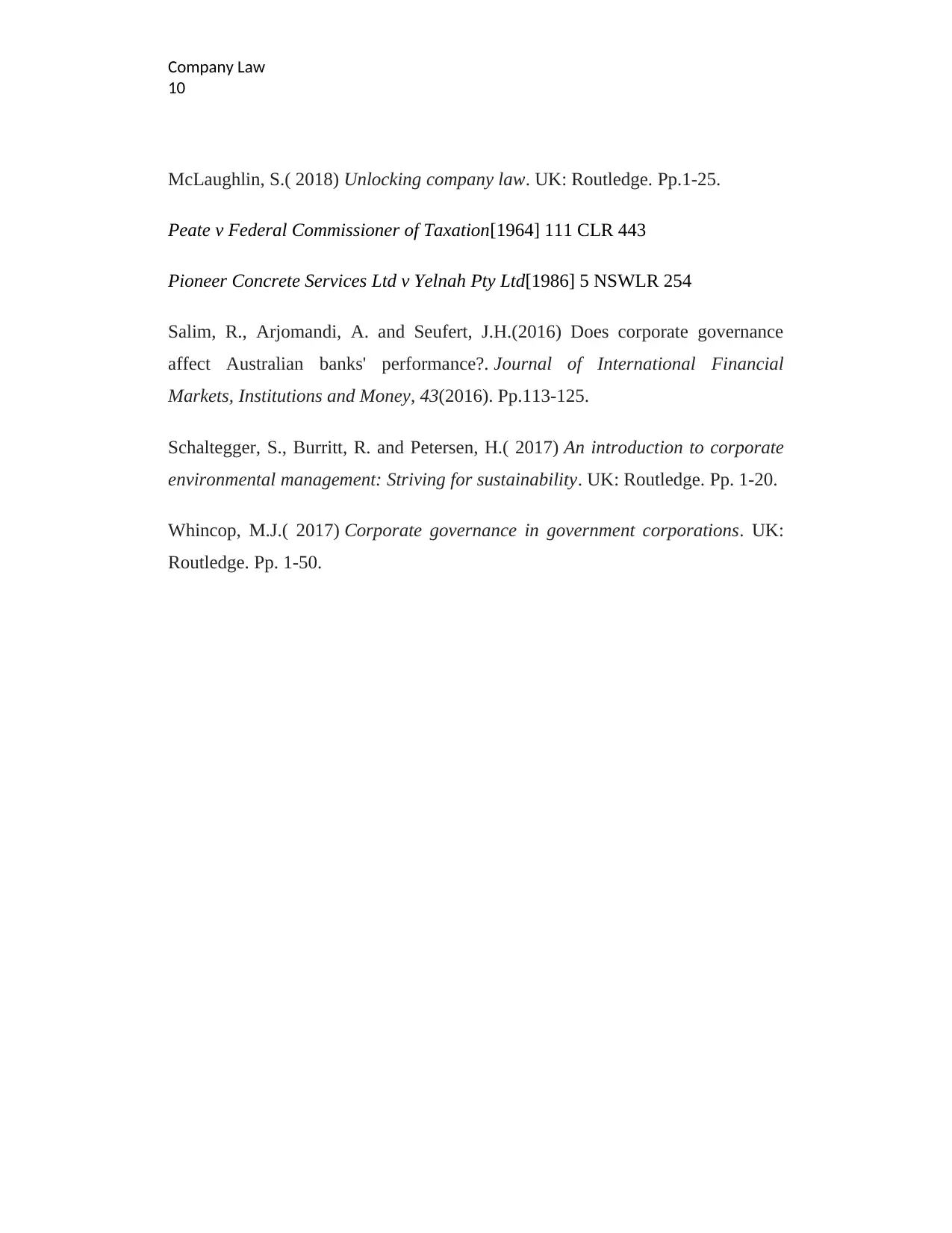
Company Law
10
McLaughlin, S.( 2018) Unlocking company law. UK: Routledge. Pp.1-25.
Peate v Federal Commissioner of Taxation[1964] 111 CLR 443
Pioneer Concrete Services Ltd v Yelnah Pty Ltd[1986] 5 NSWLR 254
Salim, R., Arjomandi, A. and Seufert, J.H.(2016) Does corporate governance
affect Australian banks' performance?. Journal of International Financial
Markets, Institutions and Money, 43(2016). Pp.113-125.
Schaltegger, S., Burritt, R. and Petersen, H.( 2017) An introduction to corporate
environmental management: Striving for sustainability. UK: Routledge. Pp. 1-20.
Whincop, M.J.( 2017) Corporate governance in government corporations. UK:
Routledge. Pp. 1-50.
10
McLaughlin, S.( 2018) Unlocking company law. UK: Routledge. Pp.1-25.
Peate v Federal Commissioner of Taxation[1964] 111 CLR 443
Pioneer Concrete Services Ltd v Yelnah Pty Ltd[1986] 5 NSWLR 254
Salim, R., Arjomandi, A. and Seufert, J.H.(2016) Does corporate governance
affect Australian banks' performance?. Journal of International Financial
Markets, Institutions and Money, 43(2016). Pp.113-125.
Schaltegger, S., Burritt, R. and Petersen, H.( 2017) An introduction to corporate
environmental management: Striving for sustainability. UK: Routledge. Pp. 1-20.
Whincop, M.J.( 2017) Corporate governance in government corporations. UK:
Routledge. Pp. 1-50.
1 out of 11
Related Documents
Your All-in-One AI-Powered Toolkit for Academic Success.
+13062052269
info@desklib.com
Available 24*7 on WhatsApp / Email
![[object Object]](/_next/static/media/star-bottom.7253800d.svg)
Unlock your academic potential
Copyright © 2020–2026 A2Z Services. All Rights Reserved. Developed and managed by ZUCOL.





